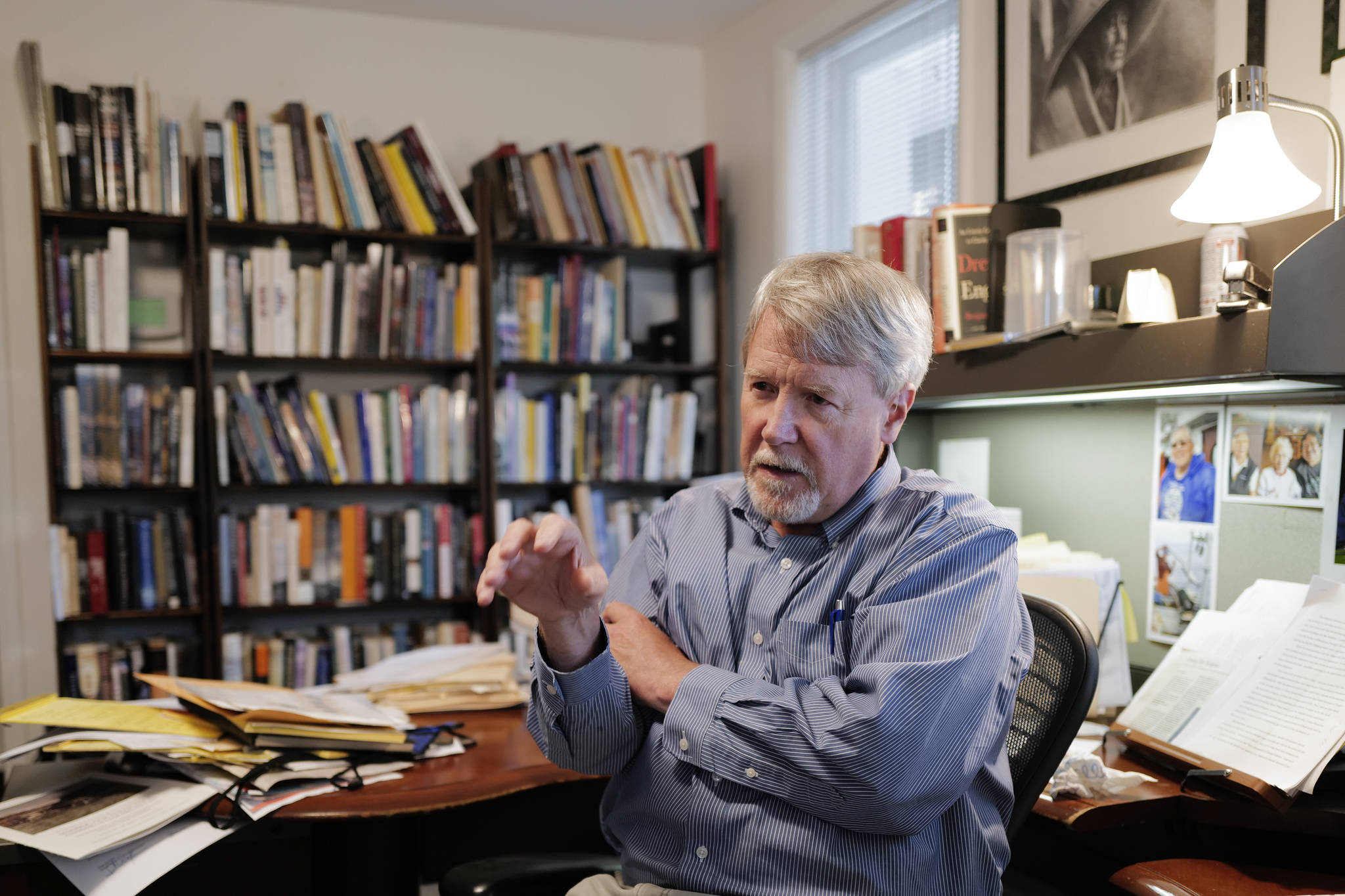A four-day conference this week features a schedule packed with presentations focused on Alaska Native cultural traditions and academically inclined lectures.
The every-other-year Sharing Our Knowledge conference is scheduled for Thursday, Sept. 26- Sunday, Sept. 29, in downtown Juneau. While it’s structured like an academic conference, organizers said the event formerly known as Tlingit Clan Conference — it brings together Tlingit clans from Southeast and Canada — makes a point to put culture bearers and researchers on equal footing.
“There’s a really rich intellectual and cultural legacy,” said Ishmael Hope, executive director for the conference and son of the late conference co-founder Andrew Hope III. “It’s a sense of multi-disciplinary, multi-ethnic approach.”
[Sharing Our Knowledge conference highlights crucial role of Tlingit Elders]
Hope said treating elders and researchers as equally important sources of information is a relatively new and positive development.
In the past, Hope said a Native culture that values politeness led elders to acquiesce to researchers’ requests as well as a lack of credit when Native insights aided research. However, Hope said crediting indigenous knowledge when it shapes a study is important.
Like the scientific method, both are based on repeated experiences.
“It’s a hard science, it’s just a different intellectual tradition,” Hope said.
Lily Hope, acclaimed weaver, conference demonstrator and Ishmael’s wife, said she’s excited about combining the art of Chilkat and Ravenstail weaving — two traditional styles of weaving — with the science behind efforts to identify and analyze Chilkat Dye.
She is part of a cohort of weavers working with Portland State University researchers exploring organic dyes and other facets of Chilkat weaving.
“It’s fun to marry them, the arts and science,” Lily Hope said.
She will also be part of a gathering of weavers working in the Alaska State Library, Archives and Museum atrium throughout the conference.
Lily Hope said making art in a public space is an important element of the conference.
“I think it reiterates that these are not dead art forms,” Hope said. “They are alive and being practiced by many of us.”
Ishmael Hope said the true collaboration between academics and indigenous knowledge embodied by the Sharing Our Knowledge conference is a productive step forward.
What’s in store
Peter Metcalfe, a conference organizer who’s been involved since its inception in 1993, said over the past quarter-century he’s seen more and more Alaska Natives give presentations as researchers with master’s degrees or doctorates rather than sharing cultural insights or traditional knowledge.
“I think it’s always been at least 50-50,” Metcalfe said. “But now it’s more like 60-40 in terms of Alaska Native vs. white or non-Native academics.”
Metcalfe falls into the non-Native category. He has a longstanding appreciation for Alaska Native culture dating back to his childhood. Metcalfe said he saw his parents maintain loyal friendships with Alaska Native people when he was a boy and later, as a publisher, Central Council of Tlingit & Haida Indian Tribes of Alaska were among his first clients.
He worked with Andrew Hope III to write the book “A Dangerous Idea,” which explores the role the Alaska Native Brotherhood played in securing Native rights.
While registration is recommended for the conference, organizers said anyone can register for it, and Metcalfe said he hopes the events find a multicultural audience. Registration can be done online at sharingourknowledge.org.
“Most people can live out their whole lives in this place and not know a damn thing about the people,” Metcalfe said. “It’s willful ignorance. It’s like being in Athens and not caring about the Golden Age of the Greeks. How can people live in a place like this and not be interested in it?”
Thursday, Friday and Saturday of the conference will all start the same way — morning presentations at Elizabeth Peratrovich Hall. Thursday’s opening is scheduled for 8:30 a.m. while Friday and Saturday are scheduled to begin at 9 a.m.
However, each day’s first talk covers drastically different ground and after the plenary speeches, each day features a variety of presentations, round tables, talks and events at EP Hall, the Father Andrew P. Kashevaroff Building and KTOO.
Both Metcalfe and Hope were pleased with the conference’s eclectic schedule, which includes an archival film screening of Alaska Native elders speaking, a Tlingit-language spelling bee, a gathering of weavers and a language-focused gathering hosted by Goldbelt Heritage Foundation. The foundation is a major financial supporter of the program.
Sunday’s events will be different and will feature a tour led by Bob Sam titled “The World of the Aak’w Kwáan.” It will feature an orientation element at University of Alaska Southeast and a ticket-required boat tour.
[Cemetery caretaker helps repatriate remains of Alaska Native children]
“What excites me is illuminating that multi-dimensionality,” Ishmael Hope said.
• Contact reporter Ben Hohenstatt at (907)523-2243 or bhohenstatt@juneauempire.com. Follow him on Twitter at @BenHohenstatt.

